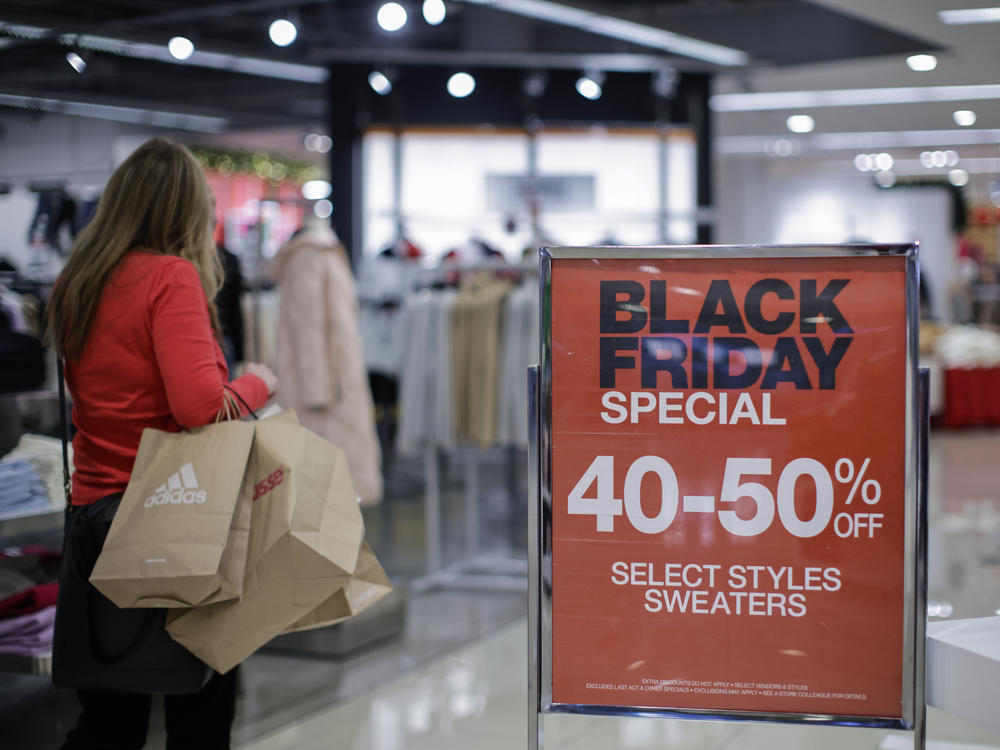Section Branding
Header Content
Here's how inflation is changing holiday deals and shopping
Primary Content
Near-record inflation has cast a shadow over this year's holiday shopping season, which officially kicked off on Black Friday. Higher prices are a top reason why retailers are predicting another record spending year. Still, there are some relatively big discounts, if you know where to look.
Here are a few trends dominating another messy end of the retail year.
We're spending more to buy less, but not across the board.
Overall, holiday shopping is costing more, both online and in stores. The National Retail Federation expects shoppers to spend between 6% and 8% more than they did last year. That is a higher increase than usual, but inflation — averaging nearly 8% at the end of October — accounts for much of that.
Shoppers are chasing sales even more than in a typical year. In surveys, more people are saying they will turn to discount stores and dollar stores for their holiday shopping.
"Prices are growing...and our budget is smaller than last November," said Manuel Rojas, arriving at a T.J.Maxx in Hyattsville, Maryland, just outside Washington, D.C. He was planning to buy the same dolls he had found last year, and hoping they were on sale.
At a mall next door, some people said inflation has pushed them to reconsider how much they spend on food — but they weren't quite ready to cut back on holiday presents.
Some data show prices for some things have started to come down. Adobe Analytics, which tracks online shopping, has noticed some of the biggest price-drops so far on electronics and computers, appliances, televisions and clothes.
Clothing, with prices declining in recent months, offers a good illustration of what's going on: Many stores have an "inventory glut," or too many of the wrong things in stock. They've ordered too much of last year's hottest items, only to contend with messed-up supply chains and quickly changing (post-)pandemic trends.
While many shoppers want deals, luxury items still appeal to the wealthy
On average, the National Retail Federation estimates people are planning to spend $833 on gifts, cards, decorations, food and other holiday purchases – slightly more than last year.
But look more closely at family income, and the story changes. People in households that earn less than $75,000 a year are expected to spend less than last year, an average of $606. Meanwhile, people in households that make over $150,000 a year plan to spend more, an average of $1,304.
This divergence in spending has grown over the year, as wealthier people continued to buy luxury goods, which have seen little inflation impact, while other shoppers have started trading down from pricier options and name brands to cheaper alternatives and store brands.
People are tapping savings and credit cards
Many people are entering the holiday season with the lowest savings levels in a while, having depleted whatever they were able to save up during the pandemic.
So people are shopping on credit. Credit card balances jumped 15% compared to a year earlier, according to this month's report by the Federal Reserve Bank of New York. That's the largest increase in more than 20 years. Adobe Analytics reports a 13% increase in people choosing buy-now-pay-later plans compared to last year.
Given high interest rates, experts urge people to pay off any debt as soon as people.
"If you have existing credit card debt, make a plan to pay it down as aggressively as your budget allows," Sara Rathner, a personal finance expert at NerdWallet, told NPR earlier this month. "I would also say if you have credit card debt, stop using your credit cards."
Copyright 2022 NPR. To see more, visit https://www.npr.org.
Bottom Content

